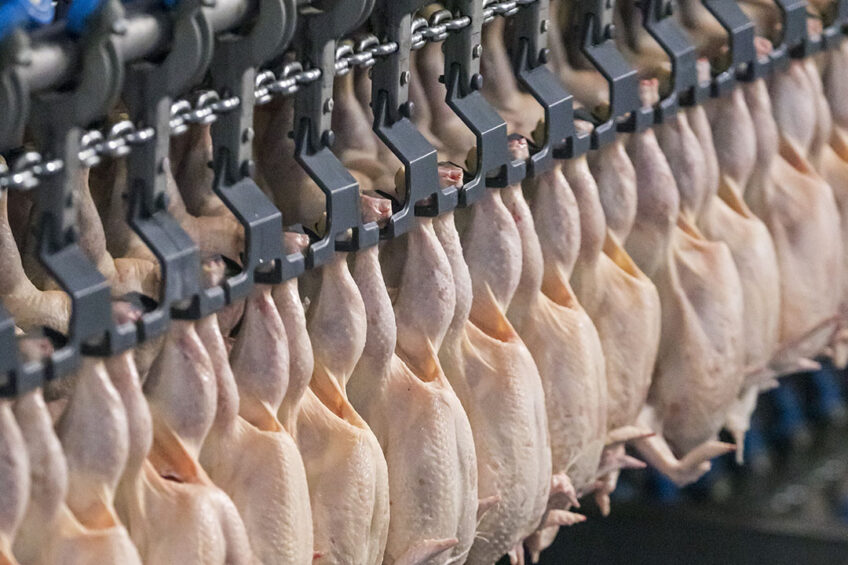Could AI robotics revolutionise poultry processing in the US?

In the US, 4 research institutions are leading the way in developing specific poultry industry artificial intelligence and robotics for the processing sector.
Backed by a 4-year US$5 million grant from the US Department of Agriculture’s National Institute of Food and Agriculture, the research organisations helped establish the Centre for Scalable and Intelligent Automation in Poultry Processing.
The collaborative effort by the University of Arkansas, Georgia Institute of Technology, University of Nebraska-Lincoln, and Fort State Valley University will ensure the merging of artificial intelligence, machine learning and robotics to advance chicken meat processing operations and sanitation.
Poultry processing line workers
Project director, Jeyam Subbiah, said the Arkansas Agricultural Experiment Station would receive nearly half of the grant (US$2.2 million) to focus on food safety automation for poultry processing plants. The impetus to automate chicken processing began with the Covid-19 pandemic when illness spread quickly among processing line workers. Since then, it’s been very difficult to hire enough workers.
“Poultry processing lines began 70-80 years ago. Since then, there have been only incremental changes in technology. Today, there is a need for transformative change,” said Subbiah.
Improve precision and reduce wastage
Subbiah said robotic hands were not adept at holding a chicken and that new technology was needed to prevent dropping slippery meats. Separating the carcases into cuts of meat was also tricky: “It’s hard enough to teach people how to use a knife with precision,” added Donyi Wang, assistant professor of biological and agricultural engineering for the Arkansas Agricultural Experiment Station.
“Robotics are fit for repetitive tasks but don’t do well with the precision needed to cut chicken products,” he added, saying that existing automation in poultry processing, like deboners, wastes a lot of meat.
“Human deboners leave about 13% of meat on the bones. Automated deboners leave 16-17%. On an industrial scale, that’s a significant loss in value. We will use artificial intelligence and virtual reality to improve precision and reduce wastage.”
Wang and Subbiah will also develop hyperspectral imaging to detect plastics in chicken meat. Wang will also develop a mobile robot that is equipped with a biosensor to produce a biological map of the facility to evaluate the efficiency of sanitation. The robot will automatically collect swabs to test for bacteria when the bio map indicates potential hot spots.
Funding
The Georgia Institution of Technology will receive US$2.1 million of the grant to focus on automating the processing lines that turn chickens into meat.
Doug Britton, manager of the Agricultural Technology Research Programme, said: “The ultimate goal is to drive transformational innovation into the poultry and meat processing industry through automation, robots, artificial intelligence and virtual reality technology.”
The remaining financial support has gone to the University of Nebraska-Lincoln, where Julia McQuillan, professor of sociology will study the effects of robotics on poultry industry labourers and how they perceive the technology.
“We hope to eventually bring new owner-operated businesses to rural areas. Collaborating with food scientists, computer scientists, extension faculty, and robotics engineers provides amazing opportunities to understand the meanings of innovations for entrepreneurs, workers and other stakeholders and to advance fundamental theories about science, technology and society in sociology.”
Finally, Brou Kouakou, associated dean for research at Fort Valley State University in Georgia, will investigate the application of technology developed through the project to see if it can be used for other meat industries.












